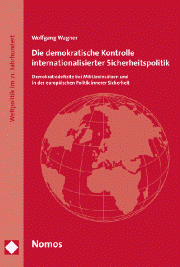 Not only the Security and Defence policy, but also internal security policies have been transformed by the nation states’ participation in international organizations such as NATO and the EU. On the basis of case studies on military interventions, Europol and the European arrest warrant, this book shows that the internationalization of security policy has led to a democratic deficit: both parliamentary control and the protection of human rights have become less effective as a result of internationalization.
Not only the Security and Defence policy, but also internal security policies have been transformed by the nation states’ participation in international organizations such as NATO and the EU. On the basis of case studies on military interventions, Europol and the European arrest warrant, this book shows that the internationalization of security policy has led to a democratic deficit: both parliamentary control and the protection of human rights have become less effective as a result of internationalization.
The author argues that this democratic deficit is troubling not only from a democratic theory perspective, but also from the point of view of peace research, as an effective democratic control has been considered the best guarantee for a cooperative and prudent security policy. The study concludes with a comprehensive discussion of the Lisbon Treaty reforms and their implications for the EU’s Common Foreign, Security and Defence Policy as well as Police and Criminal Law Cooperation.
The volume is part of a peer-reviewed series on world politics in the 21st century: Weltpolitik im 21. Jahrhundert, volume 15.
Presentation of the book in German:
Nicht nur die Sicherheits- und Verteidigungspolitik, sondern auch die Politik innerer Sicherheit hat sich von den nationalen Hauptstädten in internationale Organisationen wie NATO und EU verlagert. Anhand von Fallstudien zu Militäreinsätzen, zum Europäischen Polizeiamt Europol und zum Europäischen Haft- befehl zeigt dieses Buch, dass die Internationalisierung von Sicherheitspolitik zu einem Demokratiedefizit geführt hat: Sowohl die parlamentarische Kontrolle als auch der Grundrechts- schutz haben an Effektivität eingebüßt.
Der Autor macht deutlich, dass dieses Demokratiedefizit nicht nur aus demokratietheoretischer Perspektive, sondern auch aus Sicht der Friedensforschung höchst bedenklich ist, weil die effek- tive demokratische Kontrolle als Garant für eine kluge und zurückhaltende Sicherheitspolitik gilt. Die Untersuchung schließt mit einer umfassenden Diskussion der Reformen, die der Vertrag von Lissabon für die Gemeinsame Außen-, Sicherheits- und Ver- teidigungspolitik sowie die polizeiliche und strafrechtliche Zusammenarbeit in der EU gebracht hat.
Full info:
Die demokratische Kontrolle internationalisierter Sicherheitspolitik
Demokratiedefizite bei Militäreinsätzen und in der europäischen Politik innerer Sicherheit
Wolfgang Wagner, Nomos, 2011 (in German)